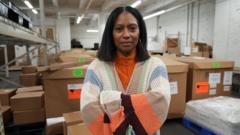As Donald Trump prepares for a potential second term, U.S. businesses, including small manufacturers, are already feeling the pressure of his promises to impose significant tariffs on goods from major trade partners. This anticipation has prompted companies like MinkeeBlue to reevaluate their supply chains, seek alternative suppliers, and stockpile inventories to mitigate financial risks associated with the impending trade changes.
US Businesses Brace for Impact of Trump's Proposed Tariffs

US Businesses Brace for Impact of Trump's Proposed Tariffs
Amidst rising uncertainties, small businesses and manufacturers shift strategies ahead of possible new tariffs by Trump.
With Trump's first day in office drawing near, many are reacting swiftly to his stated intentions of imposing a 25% tariff on goods from Canada and Mexico, along with additional tariffs on Chinese imports. Sherrill Mosee, a handbag designer from Philadelphia, shared how her firm is preparing for these potential economic shifts with urgency. The looming prospect of higher tariffs has led businesses nationwide to adapt quickly, emphasizing the need to safeguard their operations against price hikes and supply chain disruptions.
In response to these developments, leading companies like Stanley Black & Decker have already begun discussing potential price increases with customers, while firms like Steve Madden plan to move some manufacturing operations outside of China to alleviate the burden of import tariffs. Economists warn that such protective measures, intended to boost U.S. manufacturing, may instead inflate consumer prices, with predictions indicating a multi-billion-dollar cost burden on American shoppers.
Despite fears surrounding Trump's tariff policies, experts have suggested that the ultimate impact may not be as severe as anticipated. However, for small business owners like Mosee, the uncertainty alone has created significant anxiety about the future, highlighting the delicate balance between protecting jobs and maintaining affordable prices. As they navigate these challenges, companies are left pondering how to adapt in an ever-evolving economic landscape defined by trade tensions and policy unpredictability.
As the countdown to Trump's second inauguration continues, both consumers and businesses await clarity on the direction of U.S. trade policy, with many hoping for a resolution that allows for stability and growth rather than disruption.
In response to these developments, leading companies like Stanley Black & Decker have already begun discussing potential price increases with customers, while firms like Steve Madden plan to move some manufacturing operations outside of China to alleviate the burden of import tariffs. Economists warn that such protective measures, intended to boost U.S. manufacturing, may instead inflate consumer prices, with predictions indicating a multi-billion-dollar cost burden on American shoppers.
Despite fears surrounding Trump's tariff policies, experts have suggested that the ultimate impact may not be as severe as anticipated. However, for small business owners like Mosee, the uncertainty alone has created significant anxiety about the future, highlighting the delicate balance between protecting jobs and maintaining affordable prices. As they navigate these challenges, companies are left pondering how to adapt in an ever-evolving economic landscape defined by trade tensions and policy unpredictability.
As the countdown to Trump's second inauguration continues, both consumers and businesses await clarity on the direction of U.S. trade policy, with many hoping for a resolution that allows for stability and growth rather than disruption.


















